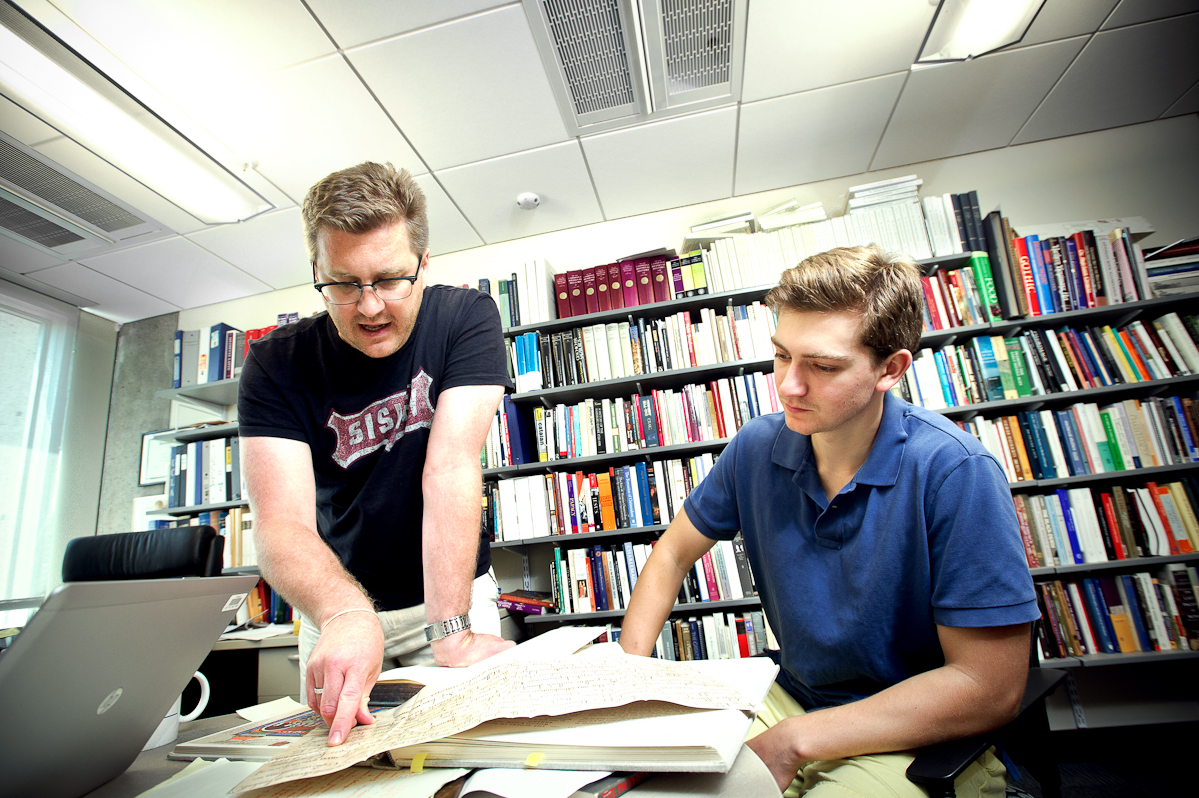
Before England was united under the monarchy, kings had to establish their legitimacy to gain and maintain power. Loyalty to the king, and support of his authority, were not yet attached to the crown, but had to be won. To discover how this was done, Matthew Currier '16 is examining royal diplomas, a type of charter specific to the crown.
Currier, a history major, is completing an Emerson project, “A Right to Kingship in Early Anglo-Saxon England: An Examination of Anglo-Saxon Kings’ Ideology of Rulership in their Royal Charters,” under the supervision of Assistant Professor of History John Eldevik.
Using eSawyer, an online database of catalogued diplomas, Currier has been able to “immerse [himself] in the background study of diplomatics, charters, and the period, in order to understand how the politics of the time worked.” These diplomas were granted at meetings of Witan, high ranking citizens close to the king. The Witan formed the official witnesses to royal diploma signings, although more often than not, they received charters as well.
eSawyer has been an incredible resource, Currier noted, allowing him to study the diplomas and discover their “formula.” The charters, he explained, are actually a remnant of roman administrative practices, designed with formality to impart a sense of legitimacy.
Currier is using these diplomas to determine how the ideology of kingship developed, specifically using examples from the eighth century Mercian Supremacy. Two Mercian kings, Aethelbald and Offa, are of particular interest due to the decades in which they they reigned.
Currier is interested in discovering how these kings built their network of patronage and established their legitimacy as rulers. Through his research, he has discovered that both of these goals are accomplished by granting royal diplomas, typically allocating land to high-ranking clergy or aristocracy. After granting land, those leaders would be obliged to show loyalty to the king, and in turn, impart that loyalty to those under their supervision.
Of particular interest to Currier is how a national identity forms around the king, replacing the idea of being conquered with being united. He explained that during the ninth century, under the rule of Alfred the Great, what we know as the “Anglo-Saxon” identity developed.
Currier first became interested in this topic after reading a book about Frankish royal diplomas by UC Berkeley Professor of History Geoffrey Koziol. The methodology that he is using for this project is based on Kozial’s work with the Carolingians, the dynasty most well-known for Charlemagne, or Charles the Great.
“The ideology of a king,” Currier explained, “develops on how other people view him and treat him. In truth, other people’s perception of kingship is what makes the King.” Although the king has a certain amount of autonomy, “in other ways, he is beholden to doing certain things because others expect him to,” he concluded.
Uncertain of what he would like to do after graduation, Currier appreciates that he has been able to develop his research abilities, and strengthened his desire to study history.
Matthew Currier is a graduate of St. John’s Preparatory School, Danvers, Mass.
Posted August 11, 2014
